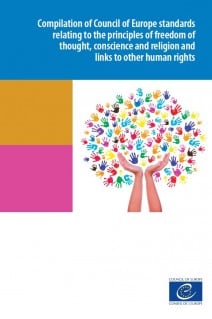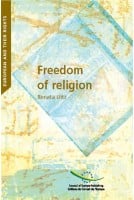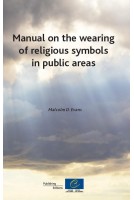



The European Court of Human Rights has described freedom of thought, conscience and religion, set out in Article 9 of the European Convention on Human Rights, as one of the foundations of a democratic society. It is of fundamental value not only for believers, but also for atheists, agnostics, sceptics and the unconcerned. The pluralism, which characterises a democratic society, depends on it.
This compilation is the first publication to provide a comprehensive overview of the existing Council of Europe standards relating to the principles of freedom of thought, conscience and religion and the links to other rights contained in the European Convention on Human Rights, as well as the jurisprudence of the European Court of Human Rights interpreting these rights. The legal standards set by the Convention are supplemented by those of other relevant treaties. There are also recommendations and guidelines adopted by other bodies, which although not legally binding, nevertheless are considered to form part of the Council of Europe compendium of standards.
These standards are presented in a non-hierarchical manner and under a number of themes, so as to stress the complementary role of the various Council of Europe bodies. The compilation is complemented by a compendium of national good practices published on the website www.coe.int/cddh. A selection of good practices from member states is appended to the compilation.
Table of contents
Preface
1. Introduction
i. The present compilation in the broader context of the Council of Europe values and work
ii. Short presentation of the various relevant Council of Europe bodies and their mandate
2. General principles and definitions
i. The right to freedom of thought, conscience and religion as a pillar of democratic society
ii. Internal and external aspects of freedom of thought, conscience and religion
iii. Limitations
iv. Positive obligations
v. Need for balancing between rights
vi. Margin of appreciation (bearing in mind the diversity of approaches taken by national authorities in this area)
vii. Duty of neutrality and impartiality of the State
viii. Non-discrimination on grounds of thought, conscience and religion
3. Thematic issues
A. Individual right to freedom of thought, conscience and religion
i. Freedom to manifest one’s thought, conscience and religion
ii. Wearing of religious symbols and clothing (dress codes)
iii. Manifestation of religion and belief in various settings
iv. Rights of persons deprived of their liberty
v. Conscientious objection to military service
vi. Situations in which individuals are obliged to disclose or act against their religion or beliefs
vii. Medical treatment issues
viii. Proselytism
ix. Right to education of children in conformity with the parents’ religious and philosophical convictions
x. Specific questions in relation to children’s right to freedom of thought, conscience and religion
B. State relations with religious communities
i. Autonomy and rights of religious communities
ii. Registration and recognition
iii. Assessment of religious movements (sects)
iv. Property (including issues related to places of worship, cemeteries etc.)
v. Financing and taxation
C. Protection of individuals on account of their thought, conscience and religion
i. Issues in relation to Articles 2 and 3 of the European Convention on Human Rights
ii. Protection of persons belonging to minority religious groups
iii. Hate speech and hate crime on grounds of thought, conscience and religion
iv. Matters relating to international protection on grounds of thought, conscience and religion
Appendix – Selection of relevant good practices from member States
Index of cases
Télécharger un extrait (1000)





The European Court of Human Rights has described freedom of thought, conscience and religion, set out in Article 9 of the European Convention on Human Rights, as one of the foundations of a democratic society. It is of fundamental value not only for believers, but also for atheists, agnostics, sceptics and the unconcerned. The pluralism, which characterises a democratic society, depends on it.
This compilation is the first publication to provide a comprehensive overview of the existing Council of Europe standards relating to the principles of freedom of thought, conscience and religion and the links to other rights contained in the European Convention on Human Rights, as well as the jurisprudence of the European Court of Human Rights interpreting these rights. The legal standards set by the Convention are supplemented by those of other relevant treaties. There are also recommendations and guidelines adopted by other bodies, which although not legally binding, nevertheless are considered to form part of the Council of Europe compendium of standards.
These standards are presented in a non-hierarchical manner and under a number of themes, so as to stress the complementary role of the various Council of Europe bodies. The compilation is complemented by a compendium of national good practices published on the website www.coe.int/cddh. A selection of good practices from member states is appended to the compilation.
Attention, en vertu de nos conditions générales de vente, l'achat des PDF/epub est réservé aux particuliers.
